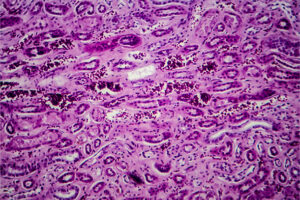Rheumatology
Systemic Lupus Erythematosus
Systemic Lupus Erythematosus: Outcomes With B-Cell Inhibition in the Real-World Setting
Overview
B-cell–activating factor (BAFF), also known as B-lymphocyte stimulator (BLyS), and a proliferation-inducing ligand (APRIL) are targets of therapeutic interest in systemic lupus erythematosus (SLE). While dual BLyS and APRIL inhibition is under investigation, BLyS-specific inhibition has been available for some time and is associated with low rates of infection.
Expert Commentary
Bevra H. Hahn, MD
|
|
“Individuals who respond to treatment with belimumab often do so over time; it can take a good 8 weeks before they report feeling better. Patients will often take belimumab for a significantly longer period of time to ensure that they are better, with many patients continuing their treatment for years.”
One of the mechanisms of interest in the treatment of SLE is B-cell inhibition. We currently have belimumab, and I am quite fond of belimumab. I believe that we have come to know its place in therapy and that we can now expand its position because it is so safe to use relative to other drugs in lupus nephritis. Additionally, telitacicept, a fusion protein that interferes with BLyS and APRIL, is in development. Interfering with both BLyS and APRIL could be considered good or bad. In earlier studies with other similar drugs, there were problems with infection, or the efficacy reported with telitacicept was not an improvement over the efficacy reported with belimumab. It is unknown whether both BLyS and APRIL can be inhibited without increasing the rates of infection, so we will have to wait and see. However, telitacicept looks pretty good, and it is on an accelerated track with the US Food and Drug Administration for approval.
In my experience, belimumab is effective in approximately half of my patients. I will generally treat patients with belimumab for 12 weeks, and if they are not responding at that point, I will switch to a different treatment—and there are many options. In the earliest data, it appeared that most of the responses were captured by 12 weeks. Some responses are observed after this time frame, but I am generally inclined to try something different for a patient with active disease at 12 weeks.
Individuals who respond to treatment with belimumab often do so over time; it can take a good 8 weeks before they report feeling better. Patients will often take belimumab for a significantly longer period of time to ensure that they are better, with many patients continuing their treatment for years. One indication that belimumab is working is when the patient wants to keep refilling it. And these individuals usually continue taking it for years. At some point, I may have them increase the interval between doses to ascertain whether they still really need it (eg, we may try to add another week between doses). If patients start experiencing symptoms associated with SLE because of missed doses, I will return to the original dosing interval. I will stop treatment in those whose symptoms are controlled with the slow taper, a strategy in patients who have received treatment for at least 1 year, maybe 2.
In clinical studies, belimumab did not increase the rate of infection compared with placebo. In my experience, however, I have noticed more infections in my patients than I would have expected. Nevertheless, these are not serious or life-threatening infections, and they do not occur more frequently than those reported with other available treatment options.
I am hopeful that, in the future, we will have the tools available to help us identify the patients who are among the 50% who are more likely to respond to treatment. While the heterogeneity of disease plays an essential role in the heterogeneity of response, identifying “super responders” would be a significant advancement in the treatment of patients with SLE. But this appears to be more challenging than one would expect.
References
Bell CF, Priest J, Stott-Miller M, et al. Real-world treatment patterns, healthcare resource utilisation and costs in patients with systemic lupus erythematosus treated with belimumab: a retrospective analysis of claims data in the USA. Lupus Sci Med. 2020;7(1):e000357. doi:10.1136/lupus-2019-000357
Collins CE, Cortes-Hernández J, Garcia MA, et al. Real-world efffectiveness of belimumab in the treatment of systemic lupus erythematosus: pooled analysis of multi-country data from the OBSErve studies. Rheumatol Ther. 2020;7(4):949-965. doi:10.1007/s40744-020-00243-2
Collins CE, Dall'Era M, Kan H, et al. Response to belimumab among patients with systemic lupus erythematosus in clinical practice settings: 24-month results from the OBSErve study in the USA. Lupus Sci Med. 2016;3(1):e000118. doi:10.1136/lupus-2015-000118
Gatto M, Saccon F, Zen M, et al. Early disease and low baseline damage as predictors of response to belimumab in patients with systemic lupus erythematosus in a real-life setting. Arthritis Rheumatol. 2020;72(8):1314-1324. doi:10.1002/art.41253
Wallace DJ, Ginzler EM, Merrill JT, et al. Safety and efficacy of belimumab plus standard therapy for up to thirteen years in patients with systemic lupus erythematosus. Arthritis Rheumatol. 2019;71(7):1125-1134. doi:10.1002/art.40861
Wu D, Li J, Xu D, et al. A human recombinant fusion protein targeting B lymphocyte stimulator (BlyS) and a proliferation-inducing ligand (APRIL), telitacicept (RC18), in systemic lupus erythematosus (SLE): results of a phase 2b study [abstract L18]. Abstract presented at: 2019 American College of Rheumatology/Association of Rheumatology Professionals Annual Meeting; November 8-13, 2019.
Yao X, Ren Y, Zhao Q, et al. Pharmacokinetics analysis based on target-mediated drug distribution for RC18, a novel BLyS/APRIL fusion protein to treat systemic lupus erythematosus and rheumatoid arthritis. Eur J Pharm Sci. 2021;159:105704. doi:10.1016/j.ejps.2021.105704











